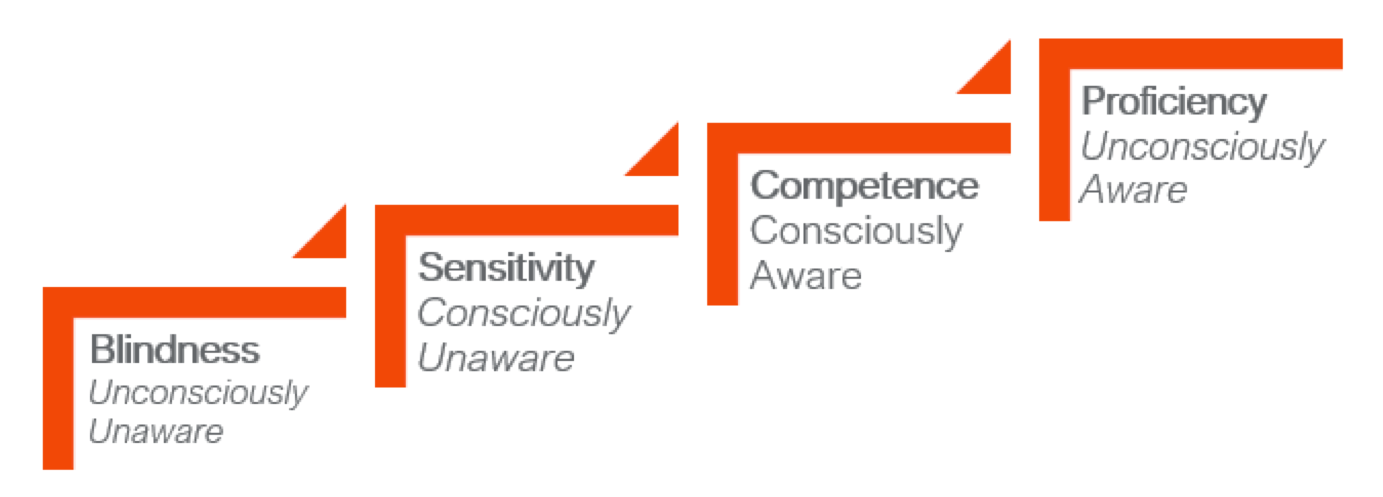Question
What are the stages of cultural awareness?
Answer

Stage 1. Blindness – Unconsciously Unaware
The first stage, also known as blindness, is where you're unconsciously unaware. At this stage, we're only aware of our own way of doing things. We're often unaware of the impact of cultural differences. We're not aware that we may be stepping on other people's toes. So, we might be saying or doing things that are really offensive to other people and literally have no idea. We're likely to be in this stage if we've not had much interaction with people of a different culture. This is where the word ignorance comes in because literally, some people are just ignorant of the fact that not everyone is like them and a lot of that has to do with a lack of experience and lack of exposure to different types of people and different types of family structures and things like that. In this stage the key phrase is, we don't know what we don't know. A lot of times when we're in this stage we literally do not know that we don't know that we're hurting people's feelings.
Stage 2. Sensitivity – Consciously Unaware
Then we move on to the sensitivity stage where we're consciously unaware. In this second stage, we're becoming aware that there are some cultural differences. We're noticing now that this family is different than ours or this person believes a different way and this person has different values than I do. We're beginning to pick up on the ways that we might be infringing upon the cultural beliefs of others. This is where we might still be stepping on some toes, but we're becoming aware that we're doing so. We're no longer ignorant about the fact that we might be upsetting people or offending people. We are in the stage of becoming aware of that, but we don't necessarily know how to fix it yet.
Stage 3. Competence – Consciously Aware
That takes us to competence where we know. In the third stage, we're aware of those cultural differences. We accept them. Not only do we accept the person and their beliefs, but we see the potential benefits of other people's values and beliefs. We may even choose to adopt some of these values or norms of these other groups. Oftentimes, the more that you're exposed to different groups and to people that have different viewpoints than you, you might choose to take on some of those beliefs. This is especially true if you're really coming to it from a place of having an open mind. This is how a lot of different religions were formed. This is how a lot of people interact and get to know people that they might not have ever even thought that they would have a relationship with, but once they give it a chance and they actually start to adopt some of the other group's beliefs and values.
Stage 4. Proficiency – Unconsciously Aware
Then you move on to proficiency, which is the last stage of cultural awareness where we're unconsciously aware. In this stage, we're fully aware of those cultural differences. We accept them. Not only do we accept them, but we actually welcome them. We do so without even having to really think about the process. It's not as if we're telling ourselves, okay, we've got to make sure that we're being cognizant of other people's viewpoints. We've got to make sure that we're being aware and not being offensive. It's almost that it's just kind of subconscious. So, at this point, accepting others' cultures and types of diversity comes naturally. This is, oftentimes, a very difficult stage to get to because it's not a natural thing. It doesn't happen overnight. As we said, this cultural awareness process is really a journey. It's something that you can't just magically do and it's something that people can't really teach because it's all about experience and really being open-minded and open to the beliefs and values and culture of others.
This Ask the Expert is an edited excerpt from the course, Diversity and Cultural Awareness, by Natasha Crosby Kile, MS.
